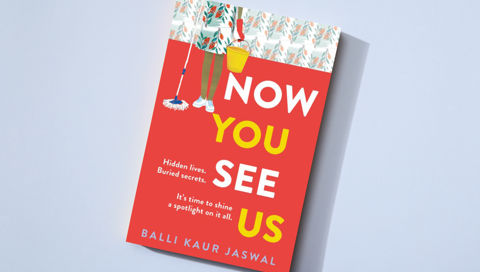Explore upcoming events

As May rapidly approaches, we are so excited to welcome you to the Festival and to introduce you to the writers who make it all worthwhile. To awaken your Festival spirit, we're got a series of Q&As to introduce some of the 2024 participants. Get to know them as we discuss their reading, their writing practice and the Festival theme, Take Me Away.
Balli Kaur Jaswal is the author of five novels, including the internationally bestselling Erotic Stories for Punjabi Widows. She was named a Best Young Australian Novelist by The Sydney Morning Herald and shortlisted for the Singapore Literature Prize. Her latest novel, Now You See Us, was released last year.
Which book would you take to a deserted island?
This might be cheating, because it’s several works in one collection, but I think I would be entertained and comforted by The Most of Nora Ephron. It contains her screenplays, novels, essays and more. If I were on a deserted island, it wouldn’t be by choice, so Nora Ephron’s work would be the perfect companion.
Is there a book you wish you could read for the first time again?
Station Eleven by Emily St. John Mandel. It gently reminded me of the hope and beauty in our world. What a gift it was to read that book for the first time.
What inspired you to write Now You See Us?
In my teens, my family moved from Singapore to the Philippines a few years after a Filipina domestic worker in Singapore was executed for murder. Being caught between two competing narratives about the case, I learned for the first time how power dynamics, censorship and national loyalties could influence ideas of truth. Years later, this moment still resonated and felt increasingly urgent as Singapore became globally known as a wealthy island-state, but our narrative of success overlooked the contributions of migrant workers from neighbouring countries.
How does your new novel build on your previous publications?
My favourite kind of fiction delves into the complexities of friendships between women and the solidarity that can be found when they work together to fight oppressive systems. I also love writing about women dispelling common notions of who they are and giving the reader some insight into the messiness of their inner lives.
Now You See Us has been described as a mix of Crazy Rich Asians and The Help but with an added murder mystery twist. How accurate would you say that description is?
As an elevator pitch, it’s efficient (rather than accurate) because it’s about the women who work as servants in the homes of Singaporeans. So The Help and Crazy Rich Asians are the best available comparisons for marketing purposes. But like all mash-ups, it’s incomplete because it wasn’t written by ChatGPT!
Now You See Us is a novel that centres the narratives and inner lives of domestic workers in Singapore, exploring their identities beyond their roles of servitude. The murder mystery brings the women together as they take advantage of their invisibility to sleuth and find justice for a friend who has been accused of murder. The title is a wry nod to the sudden conspicuousness of migrant domestic workers – and indeed all marginalised groups – when things go wrong or when society is looking for a scapegoat.
What events are looking forward to attending at the Festival?
I was obsessed with The Teacher’s Pet podcast, so I’m looking forward to seeing Hedley Thomas speak. I’m also planning on attending The Presence of the Past (featuring Shankari Chandran and Yumna Kassab) and Julian Borger’s event, I Seek a Kind Person.
